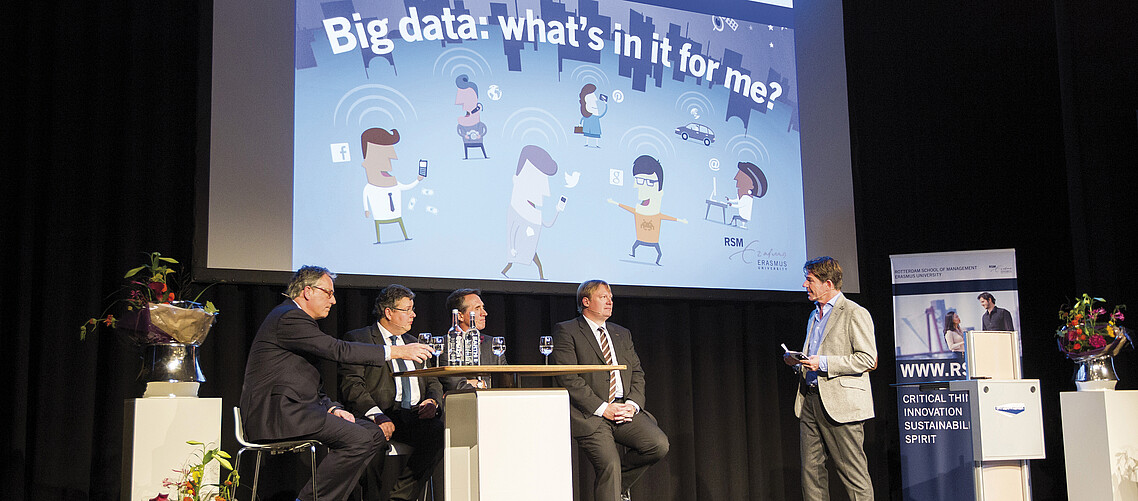Story by Justine Whittern
October’s RSM Leadership Summit at the iconic UNESCO-listed Van Nelle Ontwerpfabriek in Rotterdam featured presentations from leaders of businesses that have already implemented it into the their corporate strategies and are using it to gain competitive advantage, plus RSM faculty members who are experts on the subject. They all shared their experiences with a 600-strong audience from the business community. The resultant debate was far-reaching and eclectic. And as always, there were superb networking opportunities.
A quick poll of the audience at the start of the summit showed many did not think big data would bring a competitive advantage. The three speakers from the world of business and the two RSM academics subsequently demonstrated that it could.
The speakers came from media and learning company Sanoma, technology company Fujitsu, and international airline Lufthansa. Each demonstrated that if businesses want to find and hold on to their competitive advantage, then they need to understand the potential benefits and risks of big data and master the technology for collecting and analysing it.
Finnish media company Sanoma is using big data to help product development and innovation, said Ulla Kruhse-Lehtonen, vice-president of customer insight and analytics. Sanoma uses consumer data such as subscriptions, digital transactions, digital click streams, external data and consumer research to generate personalised content for consumers. Preparation is all-important to understand the task ahead and to organise a structure to support it, said Kruhse-Lehtonen.
Privacy is a priority
Her colleague Riikka Turunen is director of data protection and privacy at Sanoma and is helping to build security and privacy into the company’s data management processes. Riikka took the audience through what she called the “fundamental human rights” of data protection and privacy, based on those developed in 1980 by the Organisation for Economic Co-operation and Development (OECD). The size of the task of building privacy into data management shouldn’t be underestimated, and introducing and launching big data projects are huge change management operations, said Turunen.
Decisions based on big data
RSM’s Professor Peter Vervest is a specialist in information management and networks. He emphasised taking care with automated decision-making. Datasets produced by the “internet of things” are evolving, and follow as yet unknown principles. ‘We will feed these systems with data even though we might not be sure if it’s accurate or not. And they'll start making decisions on our behalf. We may already be inside The Matrix,’ he said, referring to the 1990 sci-fi film.
The internet of things
Big data can add value if the right data is collected and the right questions are asked, said Jens-Peter Seick, vice president of product management and development at Fujitsu in Europe. Fujitsu products make it possible for businesses to collect, analyse and use big data without having a team of data scientists on board. New technologies are developing fast, and the infrastructure for handling big data is easy to understand and quite mature. Technology is not a hurdle any more, and the advantage comes from using big data in the smartest way possible, he said.
Unexploited data
The economic pressure to exploit big data, especially within the aviation industry, was explained by Roland Schütz, CIO at Lufthansa. He said the airline has an unparalleled source of data that hasn’t yet been exploited and predicted that the biggest IT spending in aviation will be on customer service and personalisation. The value chain is also about hotels and airport services. ‘Airline websites look like online travel agencies. It’s convenient and complete,’ he said.
Create new business
RSM Professor Eric van Heck studies information management and markets specialising in big data and is one of the academics behind the recently launched Erasmus Centre for Data Science and Business Analytics. Big data has three levels of value for business: existing business becomes more efficient; business becomes more effective by targeting and segmenting customers; and new business is created.
But the lack of a common platform for sharing data in most companies is an obstacle and users, clients and sometimes CEOs will not – or cannot – engage in this new journey. The professor recommended going back to the drawing board to look at the enterprise architecture from a business and a technical point of view.
In conclusion, each of the expert speakers demonstrated to an enthusiastic and responsive audience the huge business opportunities in big data. They also pointed out where managers should be cautious in exploiting its potential. Once again, the Leadership Summit brought plenty of new ideas to the RSM community and offered a rare opportunity for the audience to get frank answers from senior business leaders and respected academics.
The next RSM Leadership Summit takes place on Friday, 2 October 2015.
This article first appeared in the Winter 2014 issue of RSM Outlook.

